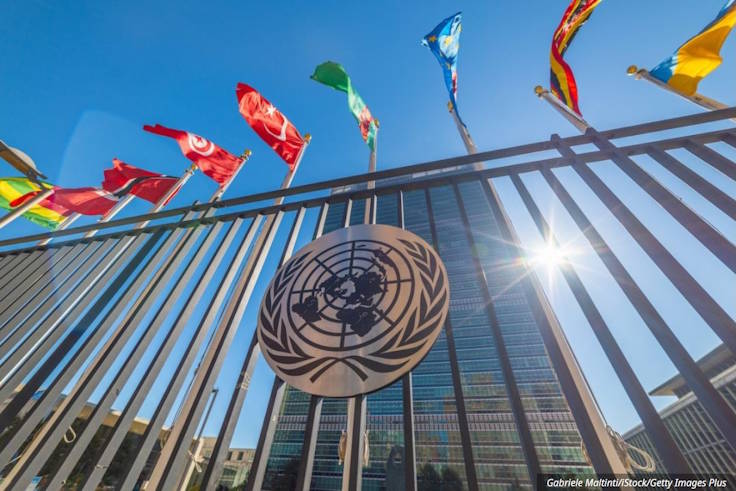
Gabriele Maltinti/iStock/Getty Images PlusUN headquarters in New York City
How the UN Climate Agenda Seeks to Control Minds and Markets
Since the rollback of many domestic climate policies during the early Trump administration, a vacuum has formed that global institutions have quickly aimed to fill. The United Nations, already central to international environmental treaties such as the Paris Agreement, seized the opportunity to expand its influence. What began as a mission to coordinate carbon reduction has transformed into an extensive system of global governance that encompasses education, finance, and individual behavior. Today, the UN climate agenda functions less as environmental stewardship and more as a plan for ideological and economic control.
Sustainable Development Goal 4.7
At the core of this global vision is Sustainable Development Goal 4.7, which advocates for “education for sustainable development and global citizenship.” According to UNESCO, this goal ensures that “all learners acquire the knowledge, skills, values, attitudes and behaviors” necessary to promote sustainable development and social justice. (UNESCO.org) However, this language masks a deeper goal. SDG 4.7 shifts education from the search for truth into a tool for fostering global conformity. It directs nations to realign curricula, teacher training, and student assessments with UN-defined ethics — essentially shaping a generation that equates compliance with virtue.
Greening Education Partnership
UNESCO’s Greening Education Partnership and “Climate-Smart Education Systems” embody this shift. Schools are not simply teaching science; they are instilling submission to an ideology of sustainability that elevates planetary allegiance above national identity or biblical truth. “Climate education” programs foster emotional conditioning, urging students to face eco-anxiety, practice mindfulness, and make lifestyle changes that align with global environmental goals. These emotional exercises are presented as personal responsibility but serve as tools for psychological conformity—tying emotional well-being to environmental obedience. (UNESCO Greening Education Partnership)
Once students internalize these values, the UN’s agenda shifts from belief to action. In policy documents and think-tank roadmaps, “climate action” is closely linked with behavioral economics and social engineering. Gamified apps, carbon footprint trackers, and global “eco-challenges” train the public to monitor their consumption habits and report their compliance. It’s not a coincidence that these behavioral tools mirror the frameworks already tested in classrooms: reward-based learning, data-driven SEL systems, and emotional analytics — all aimed at normalizing digital surveillance as good citizenship.
Financial Framework
Meanwhile, the financial framework supporting this transformation is extensive and powerful. The UN’s Roadmap for Financing the 2030 Agenda and the Task Force on Digital Financing detail mechanisms to redirect trillions of private and public funds toward climate goals. (UN.org) Using tools like ESG (Environmental, Social, and Governance) scores, carbon taxes, and green bonds, economic behavior becomes a matter of moral compliance. Corporations and investors that fail to align with UN standards are increasingly deemed unethical or even uninvestable. The Coalition of Finance Ministers for Climate Action and its Sustainable Finance Roadmaps Report make clear that national economies must build ESG frameworks and digital reporting systems to meet global disclosure expectations. (FinanceMinistersForClimate.org)
The Paris Agreement’s Article 6 Supervisory Body, operating under UN authority, further centralizes power by overseeing international carbon credit markets. (Thomson Reuters ESG Report) This system determines who may issue, sell, or trade carbon credits — creating an unelected body with substantial influence over global commerce. What seems like environmental accountability is, in truth, economic regulation on a planetary scale.
At the same time, digital technology is being used to strengthen this control. Under the UN’s Digital Financing Task Force, AI algorithms, IoT sensors, and digital IDs are promoted as tools to monitor energy consumption, individual use, and financial transactions in real time. (UNSDG.org) The result is a surveillance system where data collection is seen as a moral obligation — necessary to protect the planet. Schools are also caught in this digital net. Student behavior dashboards, emotional analytics, and “climate competency” assessments provide information to global data repositories. What starts as “climate education” ends with lifelong monitoring.
Spiritual Realignment
Beneath policies and technology lies something even deeper: a spiritual realignment. The UN’s documents and events increasingly refer to “Mother Earth,” “planetary citizenship,” and “climate justice” in moral and quasi-religious terms. The Earth Charter Initiative and Harmony with Nature program describe humanity’s purpose as “living in right relationship with the planet.” In this emerging belief system, carbon reduction replaces repentance, sustainability replaces salvation, and the Earth herself becomes the object of reverence. This is not science—it is the establishment of a new global religion, one that deifies creation and dethrones the Creator.
The UN’s climate agenda functions on three levels: the mind, by shaping beliefs through education; the market, by demanding compliance via finance; and the spirit, by redefining morals and meaning. Each level supports the others, forming a unified system of control. Children taught to feel guilt for participating in a carbon-based economy will grow into adults who accept surveillance, taxation, and censorship as righteous acts.
The real crisis we face isn’t the warming of the planet but the cooling of freedom. Behind every policy, program, and partnership, there’s a moral inversion — one that replaces personal responsibility with collective submission. The call to “save the planet” has become a mandate to give up autonomy, privacy, and belief. To preserve not just our environment but also our humanity, we must reject the false gospel of globalism that hides behind the guise of sustainability.
The future will not be determined by carbon, but by courage. Parents, pastors, educators, and citizens must wake up to what is happening: a battle for the human soul, fought through classrooms and bank accounts alike. The planet does not need new gods; it needs people brave enough to stand for truth.
Published with permission of thenewamerican.com